De Franse schrijver André Gide werd geboren op 22 november 1869 in Parijs. Zie ook alle tags voor André Gide op dit blog.
Uit: Le journal de Tityre ou Paludes
“De ma fenêtre j’aperçois, quand je relève un peu la tête, un jardin que je n’ai pas encore bien regardé ; à droite, un bois qui perd ses feuilles ; au delà du jardin, la plaine ; à gauche un étang dont je reparlerai.
Le jardin, naguère, était planté de passeroses et d’ancolies, mais mon incurie a laissé les plantes croître à l’aventure ; à cause de l’étang voisin, les joncs et les mousses ont tout envahi ; les sentiers ont disparu sous l’herbe ; il ne reste plus, où je puisse marcher, que la grande allée qui mène de ma chambre à la plaine, et que j’ai prise un jour lorsque je fus me promener. Au soir, les bêtes du bois la traversent pour aller boire l’eau de l’étang; à cause du crépuscule, je ne distingue que des formes grises, et comme ensuite la nuit est close, je ne les vois jamais remonter.
– Moi, ça m’aurait fait peur, dit Angèle ; – mais continuez, – c’est très bien écrit. »
J’étais très contracté par l’effort de cette lecture :
« Oh ! c’est à peu près tout, lui dis-je ; le reste n’est pas achevé.
– Des notes, s’écria-t-elle – ô lisez-les ! c’est le plus amusant ; on y voit ce que l’auteur veut dire bien mieux qu’il ne l’écrira dans la suite. »
Alors je continuai – déçu d’avance et, tant pis, tâchant de donner à ces phrases une apparence inachevée :
Des fenêtres de sa tour, Tityre peut pêcher à la ligne… – « Encore une fois ce ne sont là que des notes…
– Allez donc !
– Attentes mornes du poisson ; insuffisance des amorces, multiplication des lignes (symbole) – par nécessité il ne peut rien prendre.
– Pourquoi ça ?
– Pour la vérité du symbole.“
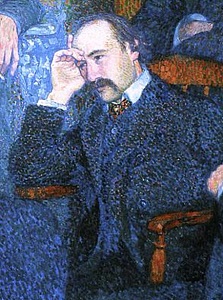
André Gide (22 november 1869 – 19 februari 1951)
Gide: Detail uit “A Reading by Emile Verhaeren” door Theo van Rysselberghe, (1901)
De Engelse dichteres en schrijfster George Eliot werd geboren op 22 november 1819 in Nuneaton in Warwickshire. Zie ook alle tags voor George Eliot op dit blog.
Day is dying
Day is dying! Float, o song,
Down the westward river,
Requiem chanting to the Day,
Day, the mighty giver!
Pierced by shafts of Time he bleeds,
Melted rubies sending
Through the river and the sky,
Earth and heaven blending.
All the long-drawn earthy banks
Up to cloudland lifting:
Slow between them drifts the swan
‘Twixt two heavens drifting,
Wings half open like a flower.
In by deeper flushing,
Neck and breast as virgin’s pure
Virgin proudly blushing.
Day is dying! Float, o swan,
Down the ruby river,
Follow, song, in requiem
To the mighty Giver!
Blue Wings
Warm whisp’ring through the slender olive leaves
Came to me a gentle sound,
Whis’pring of a secret found
In the clear sunshine ‘mid the golden sheaves:
Said it was sleeping for me in the morn,
Called it gladness, called it joy,
Drew me on ‘Come hither, boy.’
To where the blue wings rested on the corn.
I thought the gentle sound had whispered true
Thought the little heaven mine,
Leaned to clutch the thing divine,
And saw the blue wings melt within the blue!
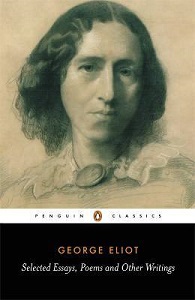
George Eliot (22 november 1819 – 22 december 1880)
Cover
De Nederlandse schrijver Dirk van Weelden werd geboren in Zeist op 22 november 1957. Zie ook alle tags voor Dirk van Weelden op dit blog.
Uit: Het laatste jaar
“Ik heb het laatste jaar, zonder Brent, ontdekt dat hij en zijn werk een soort gewetensfunctie hadden als ik aan mijn eigen boeken werkte. Het ligt subtiel, maar al die jaren dacht ik dat mijn werk er iets mee zou winnen als ik er ook iets in verwerkte van mijn verleden met Brent, van het soort kijken en schrijven zoals hij dat bedreef. Dat er een verband was met de ideeën waarmee we begonnen waren. Het onmogelijke vervolg op ons debuut verbond ons. In stilte, vanuit de dode hoek van onze gespreken En ja, ik had de neiging onze samenwerking te idealiseren.
(…)
Dat je ook nog andere dingen had willen schrijven en jezelf erom vervloekte dat je dat niet hebt gedurfd en het alsmaar hebt uitgesteld tot het te laat was, dat heeft niets te maken met de kwaliteiten van wat je wel geschreven hebt. Met mij en zonder mij. Wat mij stak en nog altijd pijn doet is dat je de indruk wekte dat je het had opgegeven. Je wilde best als beroepscolumnist de kost verdienen en trots zijn op je vakwerk, maar leven voor de mogelijkheidszin in het geschreven woord, ontdekkingen najagen in plaats van producten, jezelf en je vrienden en lezers verbazen, dat allemaal had je opgegeven. En niet uit vrije wil, maar omdat die ziekte je leven van binnenuit opvrat. Er was niet genoeg kracht meer. En als je moest kiezen, dan koos je voor het kostwinnerschap, het beroep, het geld en de mediapersoonlijkheid, al was het maar als investering in de nalatenschap voor je meiden.”
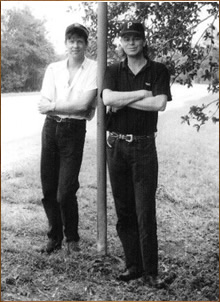
Dirk van Weelden (Zeist, 22 november 1957)
Hier met Martin Bril (rechts)
De Brits-Indische schrijverstweeling Suresh en Jyoti Guptara werd geboren op 22 november 1988 in Frimley, Hants in het zuidoosten van Engeland. Zie ook alle tags voor Suresh en Jyoti Guptara op dit blog.
Uit: Conspiracy of Calaspia
“The monsters came into full focus just before he made contact. Anatomically they resembled men, but were taller and broader, with massive heads that jutted directly forward from their necks, giving them a stooping appearance. The first few of them wavered before the muscled man bearing down on them, but it was too late. Several deft swings and slices of the axe left just as many Nurgor dead on the ground. Galar turned to the right and met his next opponents, who fought boldly now that the Dwarf had run into their midst. He fought mightily Ð and beautifully too. Whereas usually axes only chop and hack, Galar wielded his golden tool with fluidity and elegance despite its great wide head, swinging the grand weapon like an extension of his body. Its burnished surface glinted in the cruel sun, flashing with each savage stroke, gleaming despite the blood it drew.
Across the plain, the wounded man watched in amazement as the Nurgor melted before Galar’s onslaught. Even several of them at a time were no match for him. The fearsome creatures fell before his blade like blades of grass to a scythe, a parody of battle.
But something wasn’t quite right. Galar could feel his beloved axe growing heavy in his hands. His breath came in ragged bursts with every stroke of the weapon now; his legs were becoming leaden and slow compared to some minutes ago. The graze on his shoulder stung, bringing tears to his eyes. The Dwarf could feel his movements becoming sluggish and tired.”
Suresh en Jyoti Guptara (Frimley, 22 november 1988)
De Russische schrijver Viktor Pelevin werd geboren op 22 november 1962 in Moskou. Zie ook alle tags voor Viktor Pelevin op dit blog.
Uit: Buddha’s Little Finger (Vertaald door Andrew Bromfield)
“I turned and set off down the incline of the boulevard, guessing at what it was in my appearance that constantly aroused the suspicions of all these scum. Of course, I was dressed in outrageously bad taste; I was wearing a dirty coat cut in the English style with a broad half-belt, a military cap (naturally, without the cockade) like the one that Alexander II used to wear, and officer’s boots. But it did not seem to be just a matter of my clothes. There were, after all, plenty of other people around who looked far more absurd. On Tverskaya Street, for instance, I had seen a completely insane gentleman wearing gold-rimmed spectacles holding an icon ahead of him as he walked towards the black, deserted Kremlin, but no one had paid him the slightest attention. Meanwhile, I was all the time aware of people casting sidelong glances at me, and on each occasion I was reminded that I had neither money nor documents about my person. The previous day, in the water-closet at the railway station, I had tried sticking a red bow on my chest, but I removed it as soon as I caught sight of my reflection in the cracked mirror; with the ribbon I looked not merely stupid, I looked doubly suspicious.
It is possible, of course, that no one was actually directing their gaze at me any more than at anyone else, and that my tight-strung nerves and the anticipation of arrest were to blame for everything.“
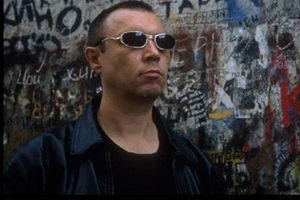
Viktor Pelevin (Moskou, 22 november 1962)
De Hongaarse dichter Endre Ady werd geboren op 22 november 1877 in het huidige Adyfalva. Zie ook alle tags voor Endre Ady op dit blog en ook mijn blog van 22 november 2010.
The Poet Of The Hortobágy
He was a large-eyed, Hunnish youth,
smitten with many a fair mirage,
and with his herd he struck into
the famous Magyar Hortobágy.
Woman and dreams have seized his soul
a thousand times with magic snare;
but when his heart would sprout a flower
the herds of cattle grazed it bare.
He often thought of wondrous things,
of wine and woman, death and birth;
he could have been a holy bard
in any other land on earth.
But he gazed upon the herds
and on the breeched, illiterate crowd,
straightway he buried all his songs;
he whistled or he swore aloud.
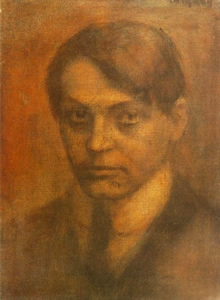
Endre Ady (22 november 1877 – 27 januari 1919)
Portret door Dezső Czigány, 1907
Zie voor nog meer schrijvers van de 22e november ook mijn blog van 22 november 2011 deel 1 en eveneens deel 2.
